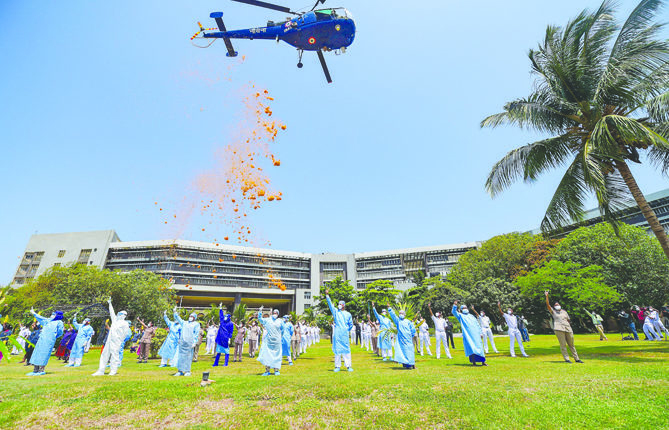
Institute of Navel Medicine, INHS, Aswini
Ownership : This website belongs to Indian Navy and is maintained by the team of Media and Public Information Cell (MPIC).
Status : This is the official Website of Indian Navy.
Purpose : The purpose of this website is to provide information and news about the Indian Navy to the general public. All information on this site is meant to inform public at large and may be distributed or copied unless otherwise specified. However, display and due acknowledgement / credit of appropriate nature is requested from the end user, as and when the information published on Indian Navy Website is used.
Warning : Any Information / Part-information / Byline / Photo / Image / Audio / Video published on Indian Navy Website is NOT PERMITTED TO BE USED in any misleading or objectionable context and for any purpose which may harm or appears to harm the interests of Indian Union, its States, its Institutions, its People and any other Human endeavour which violates the basic and fundamental rights, values, rules & regulations established in accordance with International Standards and Societal norms. Any person or organisation / entity found to violate this warning will be solely responsible for subsequent legal actions which may get initiated against them by responsible authorities in their respective domain.
Diploma in Marine Medicine
Institute of Navel Medicine, INHS, Aswini
A Diploma in Marine Medicine is a specialized program that focuses on medical issues and healthcare in the context of maritime environments. This field addresses the unique health challenges faced by individuals working at sea, such as sailors, fishermen, offshore oil rig workers, and other maritime professionals.
The curriculum of a Diploma in Marine Medicine typically covers various aspects, including:
Basic Medical Training: Fundamental medical knowledge and skills, including anatomy, physiology, and basic healthcare procedures.
Maritime Health Regulations: Understanding and complying with international and national regulations related to health and safety at sea.
Telemedicine: Learning how to provide medical assistance remotely, as access to healthcare facilities may be limited while at sea.
Infectious Diseases at Sea: Addressing the prevention, diagnosis, and management of infectious diseases that may be prevalent in maritime environments.
First Aid and Emergency Response: Training in first aid and emergency medical procedures tailored to the maritime setting, where professional medical help may not be readily available.
Environmental Health: Understanding the impact of the marine environment on health and well-being, including issues such as dehydration, motion sickness, and exposure to extreme weather conditions.
Occupational Health in Maritime Settings: Recognizing and managing health issues related to specific maritime occupations, such as injuries and illnesses associated with fishing, shipping, or offshore work.
Medical Care on Ships: Developing skills in providing medical care in confined and unique settings, including the use of limited resources.
Health Promotion and Disease Prevention: Educating individuals about maintaining good health and preventing diseases in a maritime context.
Legal and Ethical Aspects: Understanding the legal and ethical considerations in providing healthcare services at sea.
These programs are often designed for healthcare professionals, such as doctors and nurses, who wish to specialize in maritime medicine or for maritime professionals who want to enhance their medical knowledge. It's important to note that the specific content and requirements of a Diploma in Marine Medicine may vary among institutions offering such programs.
Potential career paths for individuals with a Diploma in Marine Medicine include working as maritime medical officers, onboard medical personnel, or healthcare professionals specializing in maritime health and occupational medicine.
MD - Anaesthesiology
The purpose of PG education is to create specialists who would provide high quality health care and advance the cause of science through research & training. A post graduate specialist having undergone the required training in anesthesiology should be able to recognize the health needs of the community. He or she should be competent to handle effectively medical problems and should be aware of the recent advances pertaining to his/her specialty. She/he should be highly competent anesthesiologist with broad range of skills that will enable him/her to practice anesthesiology independently. The PG student should also acquire the basic skills in teaching of medical/para-medical students. She/he is also expected to know the principles of research methodology and modes of consulting library. She/he should attend conferences, workshops and CMEs regularly to upgrade his/her knowledge. The purpose of this document is to provide teachers and learners illustrative guidelines to achieve defined outcomes through learning and assessment. This document was prepared by various subject-content specialists. The Reconciliation Board of the Academic Committee has attempted to render uniformity without compromise to purpose and content of the document. Compromise in purity of syntax has been made in order to preserve the purpose and content. This has necessitated retention of “domains of learning” under the heading “competencies”
MD - Dermatology , Venereology & Leprosy
MD - General Medicine
MD - Paediatrics
MD - Pathology
MD - Psychiatry
M. D. in Psychiatry is a Clinical Speciality course.
Doctor of Medicine in Psychiatry explores the major psychiatric syndromes like psychotic, mood and anxiety disorders, psychological effects of physical diseases, the doctor-patient relationship, human development, patient interviewing, and ethical issues in medicine. It is a three-year postgraduation course and can be pursued by any MBBS holders from a University recognized by Medical council of India. Most psychiatrists practice general psychiatry. Sub-specialization in Child and Adolescent Psychiatry, Addiction Medicine, and Geriatric psychiatry can be conducted after M. D. in Psychiatry.
MD - Radio Diagnosis/Radiology
MD/MS - Obstetrics & Gynaecology
MD/MS - Ophthalmology
MS - ENT
MS - General Surgery
MS - Orthopaedics
- Log in to post comments
- 419 views
